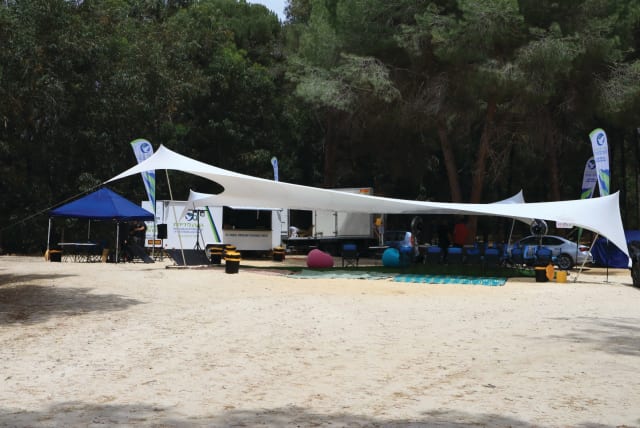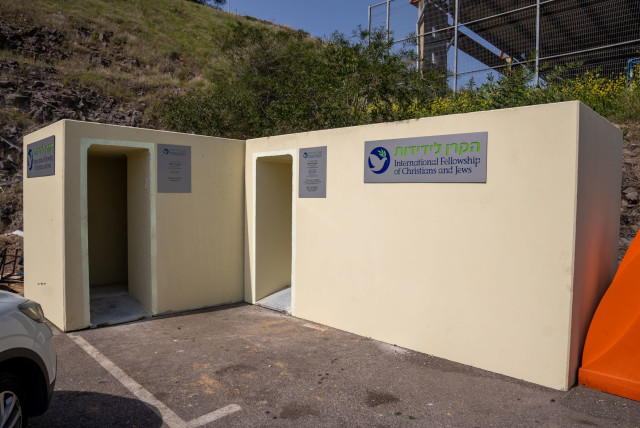IFCJ is ready to respond to emergencies, disasters in Israel - opinion

The IFCJ Mobile Emergency Response Center is now in place to respond to that reality and when the time comes, those who need it most will be lucky to be able to benefit from all that it has to offer.
For 26 years of my life, I proudly served my country in the IDF, participating in many critical missions and eventually rising to the rank of lieutenant colonel. Those years of service defined the person that I am today and taught me of the remarkable power of Israel’s military, as well as its limitations.
Upon completion of my military career, I entered Israel’s nonprofit sector, a field that I am forced to admit that I knew very little about before that point. Over the past 10 years, I have proudly served the International Fellowship of Christians and Jews (IFCJ) as the director of minority affairs and our Security and Emergency Response Division. My focus in this role is to identify areas of need within Israeli society and bring the power of the IFCJ to respond to them.
I take confidence in the belief that my uniqueness in this role is being able to take a military commander’s mindset and apply it to civilian challenges. It is this vision that inspired me to develop a project I humbly believe will make a significant contribution to our nation’s emergency response in future disasters. And while we all hope and pray that we won’t confront disasters any time soon, the reality of our nation and this region is that the next major civilian crisis is only a question of when it will occur.
The latest project being launched is the installation of the IFCJ Mobile Emergency Response Center.
What does the IFCJ Security and Emergency Response Division do?
The operational concept for this mobile unit is to be able to provide a comprehensive humanitarian response to support the work of first responders and volunteers in the event of all types of disasters. Within a matter of hours, the unit can be mobilized to travel to almost every part of Israel and provide a network of critical support services. While this is a model in use in many large urban emergency response systems outside of Israel, until now, no such option existed in Israel for civilian disasters.
As we all know, in Israeli society, there is thankfully no shortage of good-willed individuals and organizations. In the wake of disasters, people will reach out with all sorts of ideas and initiatives to try and help. But while the goodwill will be there, effective management can often be lacking and these resources will not be effectively harnessed.
Through our ongoing coordination with the Israel Police, Magen David Adom and the IDF Home Front Command, this unit will be able to be most effective in providing humanitarian first aid to those who need it most.
IN THE wake of a disaster, the unit will provide three main functions.
The first is a practical function. Upon arrival at a site, the mobile center will be able to quickly distribute all types of support materials, including food, drink and refrigeration to rescuers and support staff. Major emergencies like forest fires, natural disasters, civilian disasters like that which occurred in Meron and many other types of crises demand massive human resources and can often continue for periods of days or even longer.
Through partnerships with relevant suppliers, this unit will be equipped to provide ongoing distribution of goods as long as the need remains. In addition, it will be equipped with cellphone charging stations and mobile wi-fi access to ensure crews can stay connected wherever they might find themselves.
The second function is as a rest station. The unit is equipped to set up a temporary tent complex with 24 individual beds with privacy dividers where weary crews can sleep while their colleagues work and be ready to return to active duty refreshed without having to leave the site.
The final and no less important function is its emotional role. Disasters are extremely trying on the emotional well-being of our rescue teams and the families of those involved and this unit will allow them to know that they are being cared for in all ways possible. The mobile center is a constant reminder that we owe our responders and volunteers a debt of gratitude for their willingness to go wherever and do whatever is necessary for the needs of the people they serve.
Very early in my army career I was taught a lesson that has followed me throughout and I believe is at the heart of this project. I learned that luck is a measure of when opportunity meets readiness. While we typically view luck as some random ideal for which we can’t prepare, when it comes to the real challenges in life, being lucky is a product of actually thinking multiple steps ahead so we know that when those crises present themselves, we will have the resources in place to respond.
On behalf of the people of Israel, I am proud to be able to say that the IFCJ Mobile Emergency Response Center is now in place to respond to that reality and when the time comes, those who need it most will be lucky to be able to benefit from all that it has to offer.
The writer is a senior IDF commander (res.) and the director of the Safety and Emergency Response Division of the International Fellowship of Christians and Jews.
Jerusalem Post Store
`; document.getElementById("linkPremium").innerHTML = cont; var divWithLink = document.getElementById("premium-link"); if (divWithLink !== null && divWithLink !== 'undefined') { divWithLink.style.border = "solid 1px #cb0f3e"; divWithLink.style.textAlign = "center"; divWithLink.style.marginBottom = "15px"; divWithLink.style.marginTop = "15px"; divWithLink.style.width = "100%"; divWithLink.style.backgroundColor = "#122952"; divWithLink.style.color = "#ffffff"; divWithLink.style.lineHeight = "1.5"; } } (function (v, i) { });

